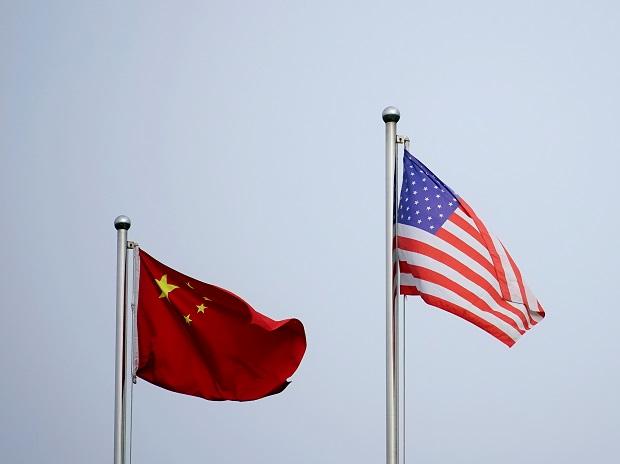Biden’s China trade plan echoes Trump’s, but assumes Beijing won’t change

By David Lawder, Nandita Bose and Andrea Shalal
WASHINGTON (Reuters) -Top U.S. trade negotiator Katherine Tai on Monday pledged to begin unwinding some tariffs imposed by former President Donald Trump on goods from China while pressing Beijing in “frank” talks in coming days over its failure to keep promises made in the Trump trade deal and end harmful industrial policies.
Tai said Washington would keep all options open to push China to stop pouring billions of dollars of state subsidies into its semiconductor, steel and other industries that Washington says harm U.S. companies.
“Above all else, we must defend – to the hilt – our economic interests,” Tai told an event hosted by the Center for Strategic and International Studies, a Washington think tank. “That means taking all steps necessary to protect ourselves against the waves of damage inflicted over the years through unfair competition.”
Washington was “prepared to deploy all tools and explore the development of new ones, including through collaboration with other economies and countries” as it charted a new course to change the trajectory of the U.S.-China trade dynamic, she said.
Tai said she would pursue a virtual meeting with Chinese Vice Premier Liu He to discuss the trade deal “soon” while starting a “targeted” process to revive exclusions for certain Chinese imports from punitive U.S. tariffs, with additional exclusion processes possible in the future.
However, she will not rule out the use of new tariffs to push China to meet the Phase 1 commitments https://www.reuters.com/article/us-usa-trade-china-details-factbox/whats-in-the-u-s-china-phase-1-trade-deal-idUSKBN1ZE2IF made under Trump, said senior U.S. officials said, speaking on condition of anonymity.
“We have a lot of work to do,” Tai said. “For too long, China’s lack of adherence to global trading norms has undercut the prosperity of Americans and others around the world.”
Tai said she expected to engage in frank conversations with her counterpart about China’s performance under the Phase One Agreement, and shortfalls in its purchase commitments, but would also engage directly with Beijing on broader issues.
The Phase 1 deal was crafted at the end of 2019, just as the coronavirus outbreak was starting to emerge in China. It is due to expire at the end of 2021. The subsequent COVID-19 pandemic caused the steepest drop in global GDP since the 1930s Great Depression, wreaking havoc on trade flows and global supply chains, which continue to struggle as demand recovers.
China agreed https://www.reuters.com/article/us-usa-trade-china-details-factbox/whats-in-the-u-s-china-phase-1-trade-deal-idUSKBN1ZE2IF to boost purchases of U.S. farm and manufactured goods, energy and services by $200 billion above 2017 levels over two years.
The deal, which halted escalation of a trade war that heaped tariffs on hundreds of billions of dollars worth of goods from both countries, also called for China to improve protections for some U.S. intellectual property and market access for American agricultural biotechnology and financial services firms.
The coronavirus pandemic hit Chinese purchases of U.S. goods hard, and they have been running at only 62% of the target, according to estimates https://www.piie.com/research/piie-charts/us-china-phase-one-tracker-chinas-purchases-us-goods by Chad Bown, a senior fellow at the Peterson Institute for International Economics.
U.S. President Joe Biden kept in place the tariffs imposed by Trump as Tai conducted a top-to-bottom review https://www.reuters.com/business/us-trade-chief-expects-engage-china-near-term-phase-1-deal-2021-05-05 of China trade policy. Biden officials have said little about their strategy thus far, focusing instead this year on rebuilding ties with U.S. allies to present a more united front to Beijing, an approach Tai said would continue to play a big role.
A system of exclusions from the tariffs of up to 25% on Chinese imports expired at end of 2020, except for some medical imports needed to fight the COVID-19 pandemic. U.S. officials said Tai would relaunch a new, “targeted” tariff exclusion process and would “keep open the potential for additional exclusion processes in the future.”
CHINA ‘MAY NOT CHANGE’
The United States will not pursue “Phase 2” negotiations with China on deeper structural issues such as massive subsidies to vital industries that skew global markets, because Beijing is “doubling down on its authoritarian state-centric approach,” the senior administration officials said.
Tai ran through run through a history of China’s failure to live up to its trade and reform commitments over the past two decades, from its accession to the World Trade Organization to the Phase 1 deal, and said it was increasingly clear that Beijing had no plans to address U.S. concerns.
“We recognize that China simply may not change, and that we have to have a strategy that deals with China as it is, rather than as we might wish it to be,” one of the officials said.
Tai noted the Biden administration was pursuing investments in technology, education and stronger supply chains to boost U.S. competitiveness and would continue work with other major democracies to address China’s “non-market” behavior.
Asked about decoupling from China, Tai said it was not realistic for the world’s two largest economies to stop trading with each other. “I think that the issue perhaps is, what are the goals we’re looking for in a kind of ‘recoupling.'”
(Reporting by David Lawder and Nandita Bose; Additional reporting by Andrea Shalal; Editing by Heather Timmons, Lincoln Feast and Marguerita Choy)
(Only the headline and picture of this report may have been reworked by the Business Standard staff; the rest of the content is auto-generated from a syndicated feed.)
business-standard.com

